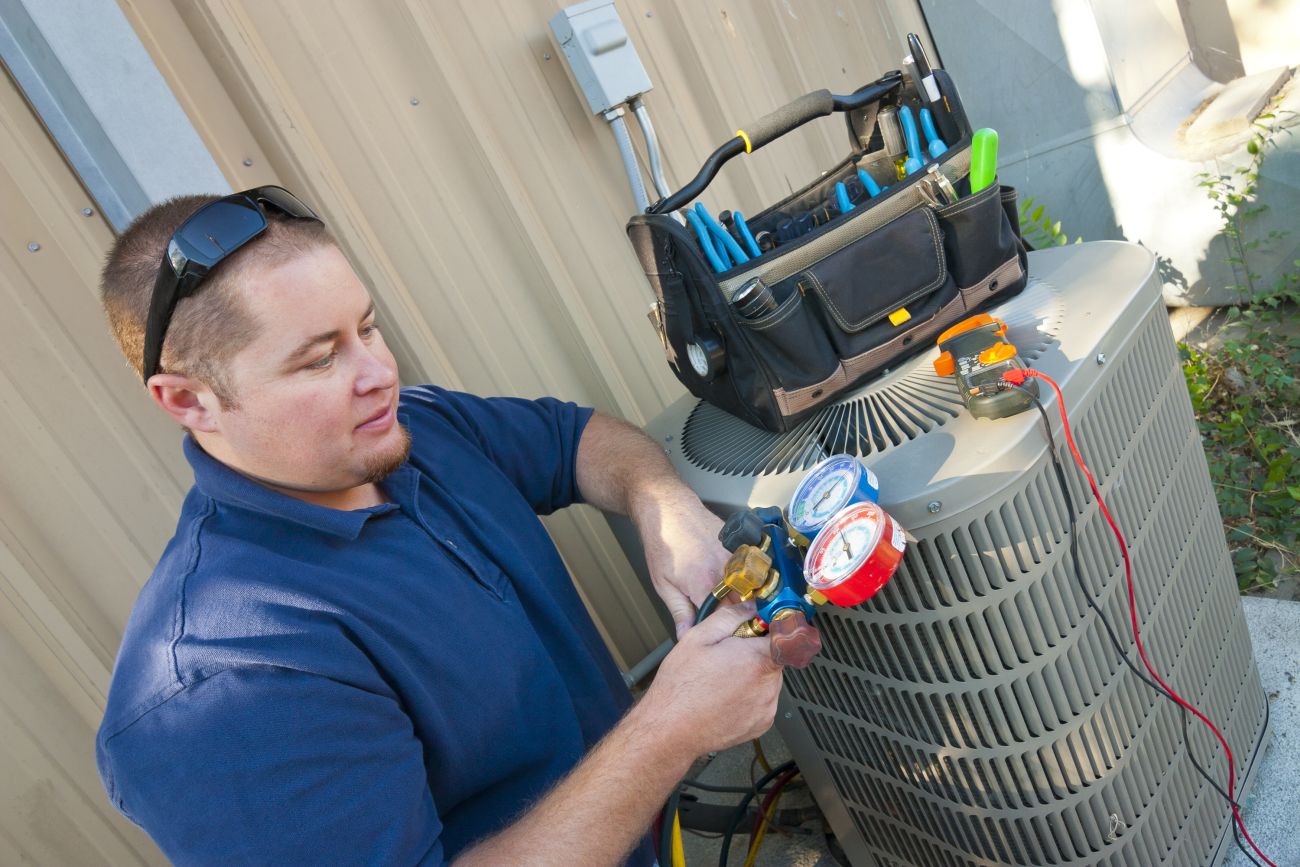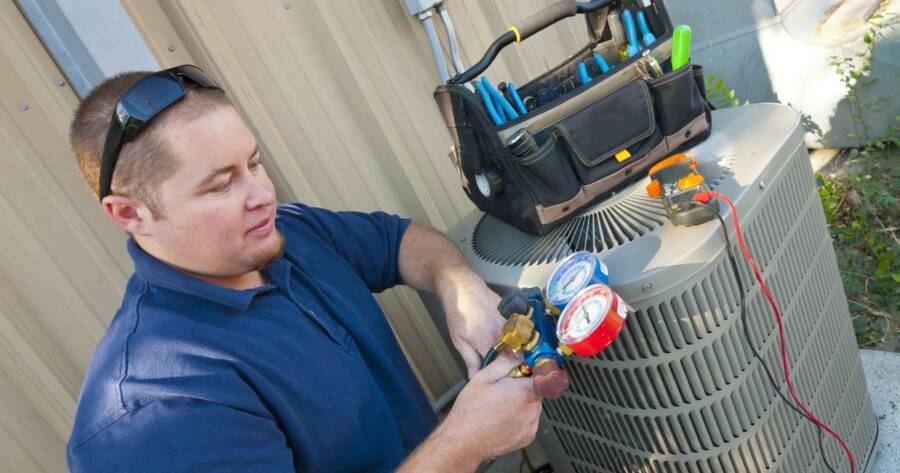A heating, air conditioning, and refrigeration mechanic and installer is often referred to as an HVAC technician. HVAC technicians work on the heating, ventilation, cooling, and refrigeration systems in residential homes, commercial buildings, offices, hospitals, and factories. These will eventually control the quality of air in these buildings.
An HVAC Technician’s salary has a wide range and it depends heavily on experience level. A newly certified technician can expect to make around $29,000 annually and a technician with years of experience can expect to make upwards of over $50,000 annually. The national average for HVAC technicians is $45,000 annually and this comes out to roughly $21.00 an hour.
HVAC Technician Job Overview
A technician’s day is rarely the same two days in a row. They respond to a variety of calls and go to many locations for repairs. You will log a lot of driving time to get to the various work sites. When they arrive at a site, they will analyze blueprints of the broken unit so they repair the it correctly. The technicians must know how to properly connect the units to fuel and water supply lines, as well as connect them to air ducts and other systems. They also need to know how to install electric wiring and test that wiring once it is installed. An HVAC technician must be able to test each individual part of a unit separately to discover which part needs to be replaced, and finally, they must be able to repair or replace worn out parts to get the system up and running again.
Why Is This So Important?
When installed in a building, a heating and cooling system controls the humidity, temperature, and the overall air quality in the region they’re attached to. HVAC systems have a similar function in freight shipping as well. They offer such complete climate control, it becomes possible to store and transport food, medicines, and other perishable items that we normally could not keep or move without fear of them spoiling.
Tools Every HVAC Technician Should Know
While working in this field you’ll encounter a wide variety of tools and the more familiar you are with them, the easier your job will be. Every HVAC technician has a core set of tools they use almost every day and those tools are:
- Wrenches
- Pipe Cutters
- Screwdrivers
- Tape Measures
- Hammers
- And various monitoring instruments
You will also need to be familiar with a small range of job-specific tools as well. Some of those tools are carbon monoxide detectors, meter, and hand seamers to name a few.
Job Requirements
The certification requirements vary from state to state. Some states require you to have an HVAC Technician Certification, while others only require on the job training. It will be easier for you if you get certified in the state you plan to work in, as it makes you more eligible for a payed position. To begin this process, you must have your high school diploma or GED. It helps if you took a math, science, and industrial arts course in high school, but it is not a requirement.
The next step is finding a community or technical college that offers the certification course. Once you find and register for the course, you’ll be required to pay between $698 to $898 to complete registration.
The general length of a course can vary between three months to just over a year. As soon as you pass the course, check to see if there is a state exam you must pass before becoming eligible for your certificate. If there is, you can sign up for this exam online or by phone, but be prepared to go to the designated testing center to actually take the test.
The final step after passing the state exam is to take your score paperwork to your local Development Services Department to apply to be recognized by the state as certified. Once you are certified, you can work anywhere in the state.
Special Certifications
There is one special certification any HVAC technician must have if they plan to work directly with refrigerants. This includes maintenance, repair, and disposal of any appliance that contains refrigerant chemicals. The technician is required to be certified through the U.S. Environmental Protection Agency (EPA) and there are four different certifications depending on what the HVAC technician is going to be working on. They are as follows:
- Type I for small appliances
- Type II for high and very high-pressure appliances
- Type III for low pressure appliances
- Universal for all appliances
The tests vary in length and difficulty and must be taken in person at the designated testing site. Type I, II, and III are each a 50-question test with roughly 25 questions covering EPA regulations and the other 25 covering recycling procedures related to their specific work area. The Universal certification test is 100 questions with 25 being general all-encompassing questions, and the rest covering Type I, II, and III evenly. You must pass this test with a minimum score of 70% or better.
Apprenticeship
If you don’t wish to do the certification course your next step would be to find an apprenticeship program and apply to learn while you are working. An apprenticeship usually lasts anywhere from three to five years and it is a way to earn both money and invaluable on the job experience. As soon as the person you’re apprenticing to thinks you are ready they can end the apprenticeship and you are free to go work on your own if you choose.
Job Outlook
The HVAC technician career field has been experiencing a steady increase for the past few years and is predicted to keep growing in demand. With a predicted 21 percent increase by the early 2020s, HVAC technicians will only grow in demand in the coming years. Over 40 of the 50 states are currently experiencing a demand for HVAC technicians. You will go into this career knowing that there is very high job security and there is no shortage of work no matter which state you choose to work in.
Where to Apply
Once you have your certification, you can look around and see what companies are hiring. You can begin with construction companies, contractors, heating and cooling companies, hospitals, and appliance repair stores to name a few.
A career in the HVAC technician industry is a smart move for anyone who wants job security and a steady income. After you pass your certifications and gain experience you should have no problem finding long-term employment.
 Neil Lockhart / Shutterstock.com
Neil Lockhart / Shutterstock.com


